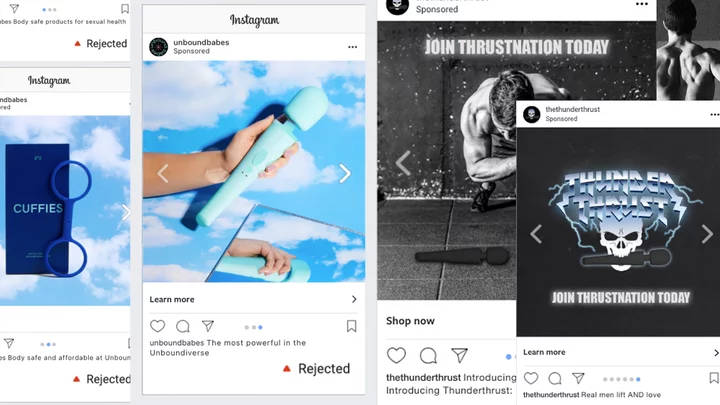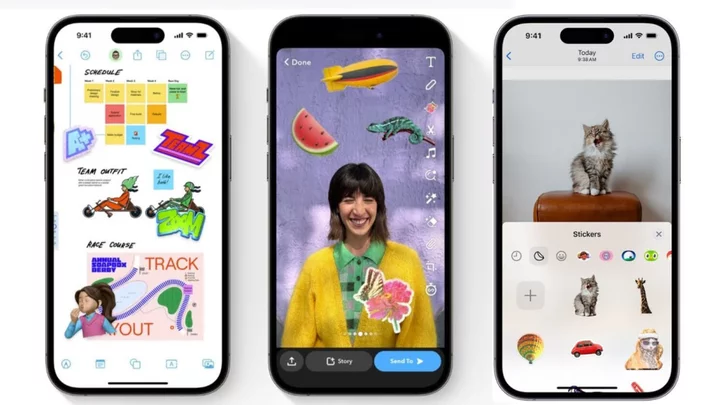For years, online and offline spaces have rejected ads for products to help make sex better for women — but approved ones for men. In 2019, sex toy brand Dame sued the MTA over rejected subway ads (which they eventually settled). That same year, Dame and fellow brand Unbound pointed out this discrepancy with a quiz on what ads are blocked versus which are approved. When the ad centers a women's sex toy, it's rejected; when it's about an erectile dysfunction product, it's approved.
It's sad to say that in 2023, the case is still the same. Now, Unbound tested whether Meta would approve its product ads if they were targeted to men — and it did.
When Unbound submitted ads for products like its Ollie wand vibrator, Bandit cock ring, or Cuffies handcuffs as they are, Meta rejected them. These ads feature the bright-colored products alone or with hands, usually in front of a colorful or sky backdrop.
"We want as many people as possible to have the best sex possible," Unbound's CEO and co-founder Polly Rodriguez said in a video on Twitter. "But the problem is that we cannot reach them."
SEE ALSO: I put AI photos on my Hinge dating profile. They were the most liked by farUnbound's senior content manager Maddy Siriouthay went on to explain that many advertising platforms write their compliance policies through the lens of family planning — products that assist or prevent pregnancy. Here is a snippet from Meta's Adult Product or Services ad policy:
Ads must not promote the sale or use of adult products or services. Ads promoting sexual and reproductive health products or services, like contraception and family planning, must be targeted to people 18 years or older and must not focus on sexual pleasure.
In practice, however, Unbound found a plethora of ads to improve erectile dysfunction and "male" sexual performance. Some of these ads contained explicit language and body parts.
As an experiment, Unbound edited their products to be in stereotypical dude colors (gray), changed the target audience, and created a name for a fake male fitness and performance enhancing company, Thunderthrust. The toys themselves stayed the same, and Unbound submitted Thunderthrust ads for approval.
Unbound's original ad for Ollie, its wand vibrator, rejected by Meta. Credit: Unbound Unbound's "Thunderthrust" ad for Ollie, approved by Meta. Credit: UnboundMeta approved these male-targeted ads.
This is a long-standing problem that companies like Unbound are fighting against. Earlier this year, these brands along with the Center for Intimacy Justice filed a complaint with the Federal Trade Commission (FTC) requesting that the FTC take action against Meta's rejection of female-focused ads. This comes after Meta's policy change in October 2022 to allow sexual health, wellness, and reproductive health ads — but, judging from this experiment, there's still more to be done.
The Center has an ongoing petition to #StopCensoringSexualHealth, which Unbound workers encourage people to sign in its Thunderthrust videos.
"These policies are discriminatory in the way they are written, because they only allow one gender identity access to the tools and information that support a holistic definition of sexual wellness," said Rodriguez in a second Twitter video.
Want more sex and dating stories in your inbox? Sign up for Mashable's new weekly After Dark newsletter.
"We'd love to talk to Meta about improving the policies so that they are less gendered in how they are written and applied, and we'd welcome any conversation at any point in time," Rodriguez told Mashable, while commenting that Meta has historically not been willing to come to the table.
Mashable reached out to Meta for comment and will update this story if received.
"Vibrator ads might seem a tedious hill to die on," said Siriouthay in Unbound's video, "but companies like Meta which own social media networks like Facebook and Instagram have major influence in what we see every day, which can then influence our subconscious beliefs, and the choices we make, and the opportunities we have."









